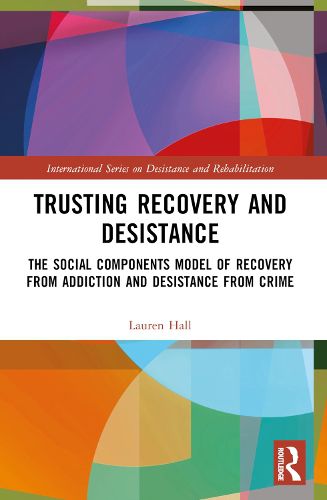Readings Newsletter
Become a Readings Member to make your shopping experience even easier.
Sign in or sign up for free!
You’re not far away from qualifying for FREE standard shipping within Australia
You’ve qualified for FREE standard shipping within Australia
The cart is loading…






The social processes which underpin and shape our lives have the power to significantly transform the trajectories of people experiencing recovery from addiction and desistance from crime. Recovery from addiction and desistance from crime are processes which are often experienced and supported in the same physical spaces and are also frequently experienced by the same people. This book therefore synthesises and presents research on the social influences of recovery and desistance.
This book presents the social component model of recovery from addiction and desistance from crime: a strength-based approach presenting case studies to better understand the social factors of both recovery from addiction and desistance from crime and therefore a step towards enhancing evidence-based policy and practice. The social components that have emerged and will be discussed within this book include relationships and social bonds; social identity, group membership, and social networks; and social capital.
Compiled based on observations, interviews, and social identity mapping methods, this work combines and presents theory and research to enhance and strengthen the evidence available for people who are already teaching about, supporting, and experiencing both desistance from crime and recovery from addiction in practice.
$9.00 standard shipping within Australia
FREE standard shipping within Australia for orders over $100.00
Express & International shipping calculated at checkout
The social processes which underpin and shape our lives have the power to significantly transform the trajectories of people experiencing recovery from addiction and desistance from crime. Recovery from addiction and desistance from crime are processes which are often experienced and supported in the same physical spaces and are also frequently experienced by the same people. This book therefore synthesises and presents research on the social influences of recovery and desistance.
This book presents the social component model of recovery from addiction and desistance from crime: a strength-based approach presenting case studies to better understand the social factors of both recovery from addiction and desistance from crime and therefore a step towards enhancing evidence-based policy and practice. The social components that have emerged and will be discussed within this book include relationships and social bonds; social identity, group membership, and social networks; and social capital.
Compiled based on observations, interviews, and social identity mapping methods, this work combines and presents theory and research to enhance and strengthen the evidence available for people who are already teaching about, supporting, and experiencing both desistance from crime and recovery from addiction in practice.